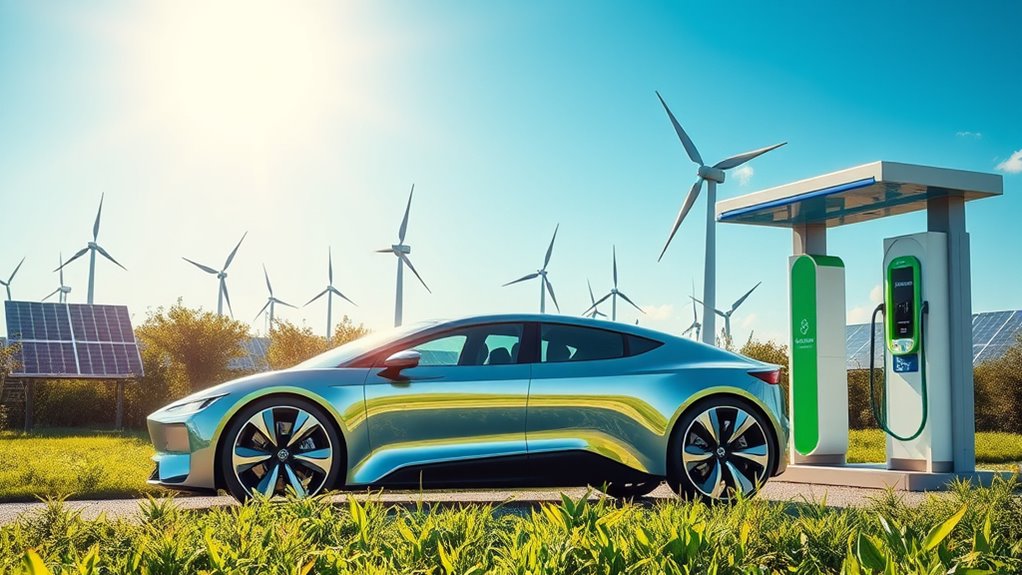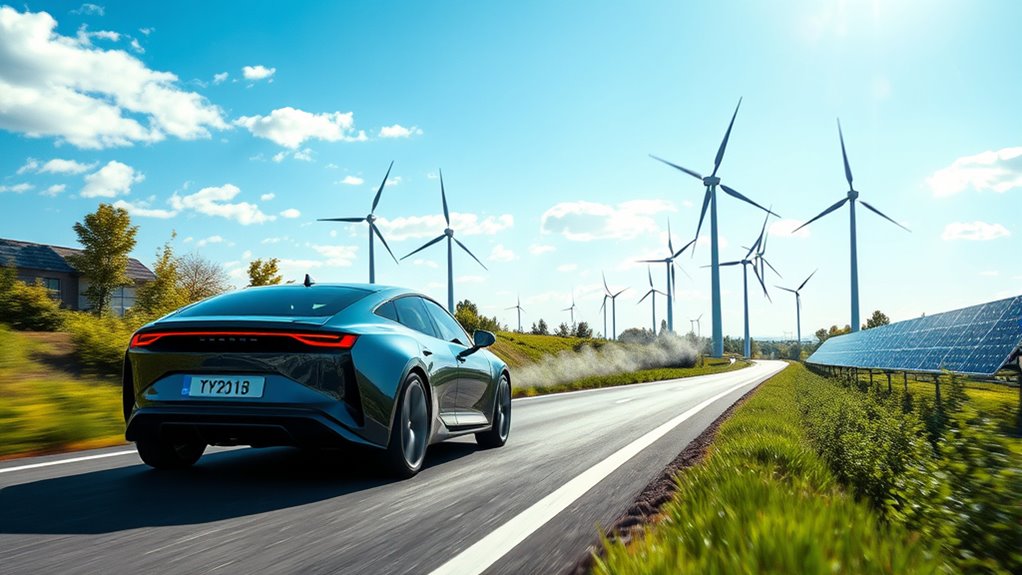Hydrogen fuel cells could be the next big thing in sustainable energy. They generate electricity efficiently, producing only water vapor as a byproduct. With quick refueling and versatile applications—from transportation to power generation—they're gaining traction. However, challenges like production methods, infrastructure, and public perception need addressing. As investments in hydrogen technology grow, it's clear that this innovative energy source plays a crucial role in a cleaner future. Discover more about their potential impact.
Key Takeaways
- Hydrogen fuel cells produce only water vapor, making them an environmentally friendly alternative to fossil fuels.
- They offer high energy efficiency and quick refueling, ideal for transportation applications.
- Hydrogen can be produced from renewable sources, enhancing energy security and sustainability.
- Investments in infrastructure and technology are increasing, improving accessibility and reducing costs.
- Hydrogen's role in energy storage and backup power systems positions it as a key player in the energy transition.
Understanding Hydrogen Fuel Cells: How They Work

When you dive into the world of hydrogen fuel cells, you'll find they operate on a simple yet powerful principle: converting hydrogen and oxygen into electricity.
Inside the fuel cell, hydrogen molecules are split into protons and electrons. The protons pass through a membrane, while the electrons create an electric current as they flow through an external circuit.
Once the protons reach the cathode, they reunite with the electrons and combine with oxygen to form water, the only byproduct. This process is efficient and quiet, making hydrogen fuel cells an attractive alternative for energy generation.
Understanding these mechanics helps you appreciate the technology's potential for various applications, from powering vehicles to supporting portable electronics.
Advantages of Hydrogen Fuel Cells in Sustainable Energy

As the world seeks cleaner energy solutions, hydrogen fuel cells stand out for their numerous advantages in sustainable energy.
You'll find that they produce only water vapor as a byproduct, making them environmentally friendly. Additionally, they offer high energy efficiency compared to traditional combustion engines, which can significantly reduce greenhouse gas emissions.
Hydrogen fuel cells can be refueled quickly, similar to conventional fuels, giving you convenience in daily use. They're also versatile, suitable for various applications, from transportation to stationary power generation.
Furthermore, hydrogen can be produced from renewable sources, enhancing energy security and reducing dependence on fossil fuels.
Current Applications and Use Cases of Hydrogen Technology

Hydrogen technology is making significant strides across various sectors, showcasing its versatility and potential.
Hydrogen technology is advancing rapidly, demonstrating its adaptability and promise across multiple industries.
In transportation, hydrogen fuel cells power buses, trucks, and even trains, providing a clean alternative to fossil fuels.
You'll also find hydrogen being used in industrial applications, such as refining petroleum and producing ammonia for fertilizers.
Additionally, fuel cell technology is emerging in stationary power generation, supplying energy for buildings and remote locations where traditional power sources are unreliable.
You can even see hydrogen fueling stations popping up, enabling easier access for consumers and businesses alike.
As innovation continues, hydrogen's role in energy storage and backup power systems is growing, making it a key player in the transition to a more sustainable energy future.
Challenges Facing the Adoption of Hydrogen Fuel Cells

Although hydrogen fuel cells offer promising benefits, several challenges hinder their widespread adoption.
First, the production of hydrogen often relies on fossil fuels, raising environmental concerns.
You'll also find that the infrastructure for hydrogen distribution is limited, making it difficult for consumers to access this energy source.
Additionally, fuel cells can be expensive to manufacture and maintain, which impacts their affordability in the market.
The storage and transportation of hydrogen pose safety risks, as it's highly flammable.
Lastly, public perception and awareness of hydrogen technology lag behind other renewable options, which can slow down acceptance.
Addressing these challenges is crucial for realizing the full potential of hydrogen fuel cells in a sustainable energy future.
The Future of Hydrogen Fuel Cells in the Energy Transition

What role will hydrogen fuel cells play in the future of our energy landscape? As we transition towards cleaner energy sources, hydrogen fuel cells could become a cornerstone of sustainable power.
Hydrogen fuel cells may become essential in our shift to cleaner, sustainable energy sources for the future.
They offer a versatile solution for transportation, residential energy, and industrial applications. You'll likely see hydrogen powering vehicles, reducing reliance on fossil fuels, and cutting emissions significantly.
In addition, hydrogen can store excess renewable energy, helping to balance supply and demand. Governments and industries are investing heavily in research and infrastructure to support hydrogen technologies.
As you embrace this shift, you'll find that hydrogen fuel cells may not only enhance energy security but also play a crucial role in achieving climate goals. The future looks promising, and you'll want to stay informed.
Frequently Asked Questions
What Is the Lifespan of a Hydrogen Fuel Cell?
The lifespan of a hydrogen fuel cell varies, but you can generally expect it to last between 5,000 to 10,000 hours of operation.
Factors like usage, operating conditions, and maintenance play a crucial role in determining longevity.
If you keep it well-maintained and operate it under optimal conditions, you might extend its lifespan even further.
Always check the manufacturer's specifications for the best guidance on your specific fuel cell model.
How Safe Are Hydrogen Fuel Cells in Everyday Use?
You might think hydrogen fuel cells are risky, but they're actually designed with safety in mind.
While they do use hydrogen, which is flammable, modern technology includes robust safety measures like leak detection and pressure regulation.
So, in everyday use, you're likely safer than you'd expect. Plus, their emissions are clean, making them an attractive option.
Balancing risks and benefits, you'll find hydrogen fuel cells can be a practical choice for sustainable energy.
Can Hydrogen Fuel Cells Be Recycled?
Yes, hydrogen fuel cells can be recycled, but the process is still developing.
When you use a fuel cell, its components, like the membranes and catalysts, can often be recovered and reused.
It's important for you to stay informed about recycling initiatives in your area, as they can vary.
As technology advances, the recycling processes are expected to improve, making it easier for you to participate in sustainable practices.
What Are the Costs Associated With Hydrogen Fuel Cell Production?
When you look at the costs of hydrogen fuel cell production, you'll find several factors at play.
First, the materials, like platinum and other catalysts, can be pricey.
Then there's the manufacturing process itself, which requires advanced technology and infrastructure.
You'll also need to consider the costs of hydrogen production, whether through electrolysis or natural gas reforming.
How Do Hydrogen Fuel Cells Compare to Battery Electric Vehicles?
When you compare hydrogen fuel cells to battery electric vehicles, you'll notice key differences in efficiency and refueling times.
Hydrogen fuel cells can refuel in minutes, while battery electric vehicles often take longer to recharge.
However, battery electric vehicles tend to have higher energy efficiency and a more established charging infrastructure.
Ultimately, your choice may depend on your driving needs, availability of hydrogen stations, and preference for refueling speed versus efficiency.
Conclusion
In exploring the potential of hydrogen fuel cells, it's clear they could revolutionize our energy landscape. While skeptics argue about efficiency and infrastructure, the truth is that advancements are rapidly addressing these challenges. With increasing investments and innovations, hydrogen technology is poised to play a crucial role in reducing carbon emissions and fostering sustainability. If we embrace this shift now, we might just find hydrogen fuel cells are the game-changer we need for a greener future.









